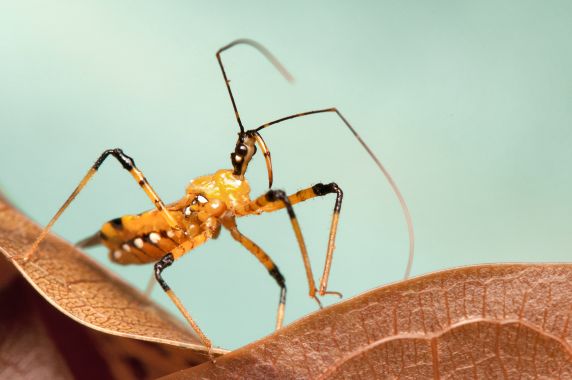Dogs and bugs go together! When dogs are inside or outside, they sometimes have fun chasing all types of bugs, such as flies or even Assassin bugs! It’s almost like our canine friends love the chase. But in the end, some dogs will eat the bugs they’ve caught! But what happens if a dog eats an assassin bug?
Connect with a verified veterinarian in minutes. Licensed vets are available 24/7 to answer your questions. No need to worry about your furry family member.
Has your dog eaten an assassin bug? Are you worried that the assassin bug will make your dog sick? If so, you’ve come to the right place. We understand it can be scary when your dog eats something like this.
We’ve gathered information about assassin bugs and whether they can make a dog sick. Let’s get started!

What is an Assassin Bug?
An assassin bug, also called a kissing bug, is a predatory insect. In other words, it’s a bug that eats other bugs! They’re great in the garden because they eat harmful pests that can cause damage to your plants and flowers.
Once in a while, assassin bugs may also find their way into your home. They can get in through doorways and windows. In the house, they may bite you or your dog! The bugs are venomous and their bites can cause pain at the site. They can also carry parasites that can infect you or your dog.
So, what happens if your dog eats an assassin bug?
Assassin Bugs & Dogs
One such parasite is the one that causes Chagas disease. The name of the parasite that causes this disease is the Trypanosoma cruzi. Chagas disease is mainly found in the southern part of the US, South & Central America. The parasite is carried in the assassin bug’s feces.
The assassin bug’s feces (poop) can enter a bite wound or make contact with the mucus membranes. That’s all it takes to become infected with Chagas disease. And a dog that eats an assassin bug may also become infected with Chagas disease.

Review symptoms, medications & behavior to keep your pets healthy with a Vet Online in just minutes.
Ask a Vet Live NowSymptoms of Assassin Bug Ingestion in Dogs
You may notice these symptoms if your dog has eaten an assassin bug:
- Lethargy
- Depression
- Fever
- Weakness
- Diarrhea
- Neurological issues
- Enlarged lymph nodes
- Heart failure
- Increased heart rate
If you notice these symptoms in your dog, call the vet immediately. This is an emergency.
Treatment of Assassin Bug Ingestion in Dogs
There’s no known cure for Chagas disease; however, some medications have been shown to be effective during the first phase of the disease. For instance, benznidazole has been shown to control the development of the disease.
Other symptoms caused by Chagas disease are treated with the proper medications such as heart arrhythmias and more.
The prognosis is best for dogs who receive prompt treatment after eating an assassin bug. If your home and yard seem to be infested with these insects, it may be time to call in a professional exterminator to get rid of the problem. Then you and your fur baby can safely be outside in the fresh air once again! And you won’t have to worry about these critters in your home!
Connect with a verified veterinarian in minutes. Licensed vets are available 24/7 to answer your questions. No need to worry about your furry family member.

Julie
Julie is a graduate of the University of North Carolina, Wilmington, where she studied Animal science. Though contrary to the opinion of her parents she was meant to study pharmacy, but she was in love with animals especially cats. Julie currently works in an animal research institute (NGO) in California and loves spending quality time with her little cat. She has the passion for making research about animals, how they survive, their way of life among others and publishes it. Julie is also happily married with two kids.
Review symptoms, medications & behavior to keep your pets healthy with a Vet Online in just minutes.
Ask a Vet Live Now




